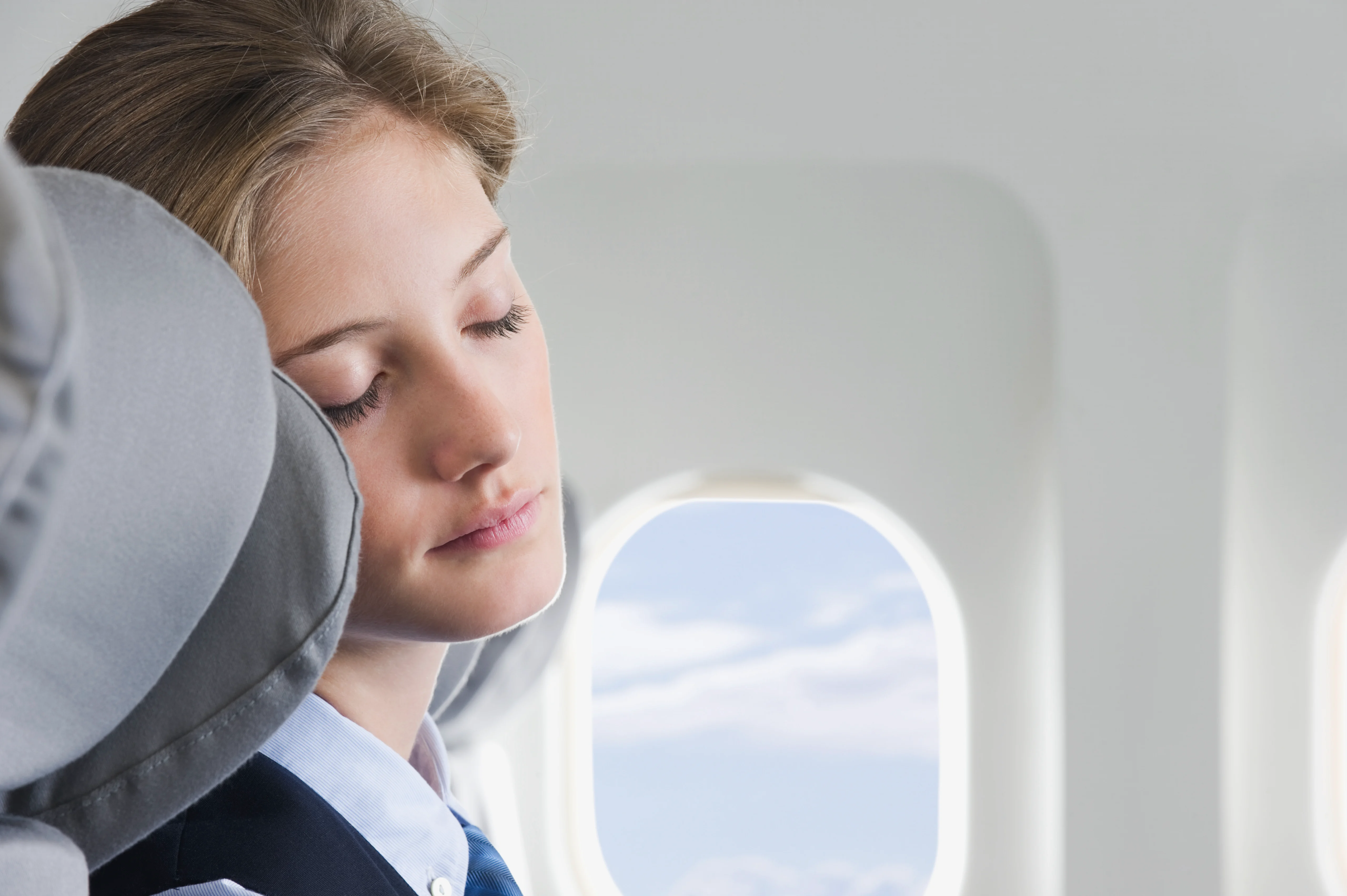Jet lag is a common challenge for travelers crossing multiple time zones. It disrupts your natural sleep-wake cycle, leaving you tired, disoriented, and out of sync with the local time.
Understanding what jet lag is and how it affects your body is the first step to managing its symptoms and recovering faster.
What Is Jet Lag?
Jet lag is a temporary sleep disorder caused by rapid travel across different time zones. When you move quickly from one time zone to another, your internal body clock, which regulates sleep, hunger, and other functions, gets confused because it’s still set to your original time.
This misalignment can cause fatigue, difficulty sleeping, digestive issues, and trouble concentrating until your body adjusts.
What Causes Jet Lag?
Jet lag results from several factors that disrupt your body's natural rhythms when you travel across time zones quickly. Understanding these causes can help you manage symptoms better.
Time Zone Changes
Crossing multiple time zones rapidly means your internal clock is no longer aligned with the local time. Your body still operates on your home time zone’s schedule, which confuses sleep patterns, hormone release, and other bodily functions.
Disruption to Circadian Rhythm
Your circadian rhythm is a roughly 24-hour cycle that regulates sleep, wakefulness, hunger, and other processes. It’s mainly controlled by exposure to light and darkness. When you fly across time zones, your circadian rhythm becomes misaligned with the environment, leading to the symptoms of jet lag.
Factors That Make Jet Lag Worse
Some aspects of travel and individual differences can make jet lag symptoms more intense or last longer. Knowing these factors can help you prepare and manage your recovery better.
- Long-Haul Flights: Longer flights often cross more time zones and involve prolonged periods of inactivity, making jet lag symptoms stronger.
- Crossing Multiple Time Zones: The more zones crossed, the harder it is for your body to adjust, increasing the severity of jet lag.
- Eastward vs. Westward Travel: Flying east (losing time) is typically harder to adjust to than flying west (gaining time) because your body must fall asleep earlier.
- Age and Individual Sensitivity: Older adults and some individuals are more sensitive to time changes and may experience longer or more severe jet lag symptoms.
Common Symptoms of Jet Lag

Jet lag affects people differently, but certain symptoms are common and can significantly impact your daily functioning after traveling across time zones.
- Fatigue and Daytime Sleepiness: You may feel overwhelmingly tired or sleepy during the day, even if you think you’ve had enough rest. This excessive fatigue happens because your body’s internal clock hasn’t aligned with the new time zone yet.
- Insomnia or Disturbed Sleep: Many people find it difficult to fall asleep or stay asleep in a new environment. Your body’s confusion about when to rest can lead to insomnia, restless nights, waking up too early, or fragmented sleep.
- Difficulty Concentrating: Jet lag often causes mental fog, making it hard to focus on tasks or think clearly. This “brain fog” can reduce productivity and make even simple activities more challenging.
- Mood Changes or Irritability: Disrupted sleep and constant fatigue can affect your mood, leading to feelings of irritability, anxiety, or mild depression. These emotional shifts are common until your body adjusts.
- Digestive Issues: Changes in meal times combined with your body’s misaligned rhythms can cause stomach discomfort, constipation, or loss of appetite. Digestive problems often accompany jet lag, making you feel even more unsettled.
How Long Does Jet Lag Last?
The length of jet lag varies depending on several factors. Understanding typical recovery times can help you set expectations and plan accordingly.
Average Duration by Time Zones Crossed
On average, it takes about one day per time zone crossed to fully adjust to the new schedule. For example, if you cross five time zones, expect about five days to recover. However, this can vary depending on individual factors.
Why Some People Recover Faster Than Others
Individual differences such as age, general health, sleep habits, and how well you prepare before and after travel influence how quickly you bounce back. Younger people often recover faster, and those who manage light exposure and sleep schedules proactively tend to experience less severe symptoms.
How to Prevent Jet Lag
Jet lag can be an unwelcome part of long-distance travel, but with thoughtful preparation, you can greatly reduce its impact.
By taking proactive steps before you leave, making smart choices during your flight, and managing your time and environment after arrival, you help your body adjust faster to the new time zone. This not only lessens fatigue and discomfort but also lets you enjoy your trip from day one.
Before You Travel
Preparing your body before departure is key to reducing jet lag symptoms.
- Gradually Adjust Your Sleep Schedule: Shift your bedtime and wake-up time by 1–2 hours closer to your destination’s time zone a few days before you travel. This helps your internal clock begin to adapt in advance.
- Get Plenty of Rest Before Flying: Starting your trip well-rested makes your body better equipped to handle the stress and fatigue of travel. Avoid traveling on zero sleep when possible.
- Stay Hydrated and Avoid Alcohol: Drink plenty of water in the days leading up to your trip and avoid alcohol, which can dehydrate you and affect sleep quality.
During the Flight
Adopting the new time zone schedule during your flight can reduce jet lag when you land.
- Set Your Watch to the Destination Time: This mental adjustment helps you start thinking in the new time zone and cues you to adapt your sleep and eating patterns accordingly.
- Sleep and Eat According to Destination Time: Try to sleep and eat on the plane according to your arrival schedule. This signals your body to begin adjusting its rhythm sooner.
- Avoid Caffeine Close to Sleep: Caffeine can interfere with your ability to fall asleep, so avoid it in the hours before you plan to rest during your flight.
After You Arrive
How you manage your time and environment after arrival plays a big role in how quickly you recover.
- Get Sunlight Exposure: Natural light is the strongest cue for resetting your body clock. Spend time outdoors, especially in the morning if you traveled east.
- Try to Stay Awake Until Local Bedtime: Resisting the urge to nap until it’s nighttime locally helps your body sync with the new schedule faster.
- Avoid Naps (or Keep Them Short): If you must nap, limit it to 20–30 minutes to avoid interfering with your nighttime sleep.
Natural Remedies and Treatments for Jet Lag

Besides adjusting your schedule and habits, some natural remedies and treatments can help ease jet lag symptoms. These methods support your body’s ability to reset and recover more comfortably.
- Melatonin Supplements: Melatonin is a hormone your body produces to signal sleep. Taking low-dose melatonin supplements in the evening can help reset your internal clock, especially when traveling across multiple time zones. It’s important to take melatonin at the right time and consult a healthcare professional before use.
- Light Therapy: Exposure to bright light at specific times helps adjust your circadian rhythm. Light therapy lamps or simply spending time outdoors in natural sunlight, particularly in the morning, can promote faster alignment with the new time zone.
- Staying Active During the Day: Physical activity increases alertness and boosts your mood. Moving around during the day, whether it’s light exercise or a brisk walk, can help counteract fatigue and encourage better sleep at night.
- Relaxation Techniques Like Meditation: Stress and anxiety can worsen jet lag symptoms. Techniques such as meditation, deep breathing, or gentle yoga help calm your mind and body, making it easier to fall asleep and improve sleep quality.
When to See a Doctor
Most cases of jet lag resolve within a few days, but sometimes symptoms persist or interfere significantly with your life. Knowing when to seek medical advice ensures you get the right support.
Jet Lag Symptoms Persist for More Than a Week
If you continue to experience severe fatigue, insomnia, or other jet lag symptoms for more than seven days after arrival, it’s a good idea to consult a healthcare professional. Prolonged symptoms might indicate an underlying sleep disorder or another health issue.
Sleep Disturbances Affect Daily Functioning
When sleep problems caused by jet lag interfere with your ability to work, study, or maintain relationships, medical guidance may be necessary. Persistent tiredness and mood changes can impact your quality of life and require professional evaluation.
Consideration of Prescription Sleep Aids or Melatonin Under Medical Advice
While melatonin supplements can help, using prescription sleep medications should always be done under a doctor’s supervision. A healthcare provider can recommend the safest and most effective treatment based on your individual health and travel needs.
FAQs
Can Jet Lag Be Completely Avoided?
While it’s difficult to avoid jet lag entirely when crossing multiple time zones, proper planning and strategies can greatly reduce its severity and duration.
Is Jet Lag Worse When Flying East or West?
Jet lag tends to be worse when flying east because your body must advance its sleep schedule, which is generally harder than delaying it, as happens when flying west.
Does Melatonin Work for Jet Lag?
Yes, melatonin can be effective in helping reset your internal clock and improving sleep after travel, but it works best when taken at the appropriate time and under guidance.
How Does Jet Lag Affect Older Adults or Children?
Older adults often experience more severe and prolonged jet lag due to changes in sleep patterns, while children may adjust faster but can still show symptoms like irritability and tiredness.
Are There Any Foods That Help With Jet Lag?
Eating light, balanced meals at local times supports your body’s adjustment. Foods rich in magnesium (like nuts and leafy greens) and those that promote sleep (like chamomile tea) may help, but no specific food cures jet lag.
Conclusion
Jet lag is a common but manageable condition that comes with rapid travel across time zones. By understanding its causes, symptoms, and effective prevention and treatment strategies, you can minimize its impact on your body and enjoy your travels more fully.
With good preparation and simple lifestyle adjustments, overcoming jet lag becomes much easier, allowing you to arrive refreshed and ready to explore.
Dom Abraham
As the lead content writer at Sleepiverse. Dom pours his heart into writing mattress reviews, bedding product reviews, and medically-reviewed health articles. Dom is from Portugal and likes to spend his free time writing on the beach as it gives him a sense of comfort. Aside from writing mattress reviews in front of the soothing beach view, Dom likes to experiment with new amazing food ideas.


